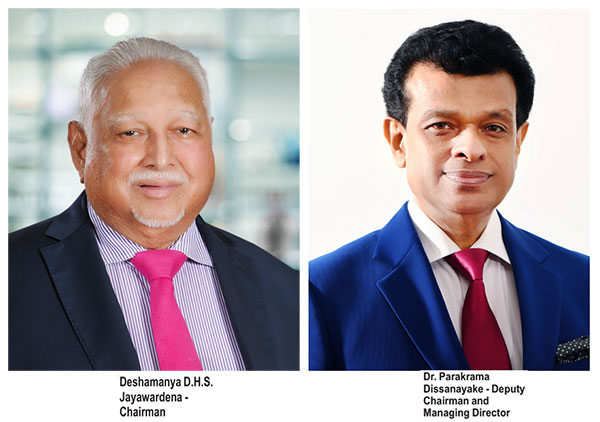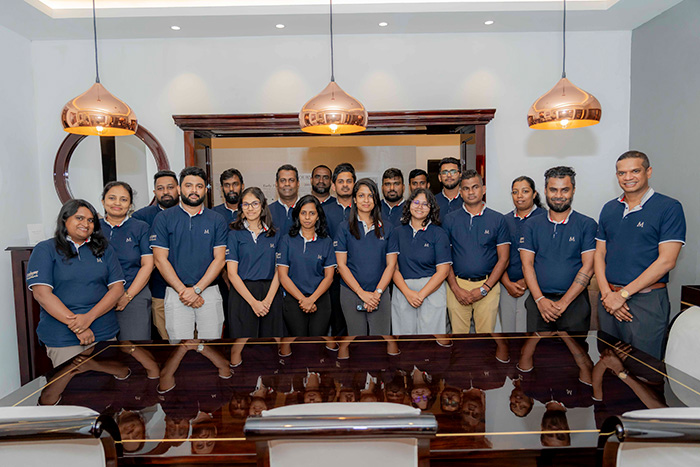Business
Aitken Spence reports its highest ever Q3 PBT of Rs. 3 Bn

The leading blue-chip conglomerate, Aitken Spence PLC reported its best ever third quarter (Q3) performance with a Profit-Before-Tax (PBT) of Rs. 3 Bn in Q3 2021-22, a significant turnaround from the third quarter Q3 of the previous year. The Group’s businesses including the tourism sector is showing positive momentum. Across all sectors, the Group’s earnings before interest expense, tax, depreciation and amortisation (EBITDA) was Rs. 5.2 Bn compared to Rs. 1.2 Bn in Q3 of the previous year. The Group also recorded an EBITDA of Rs. 9.8 Bn for the nine months ended 31st December 2021. Despite considerable economic headwinds, the organisation’s agile strategy was reflected in the Group’s overseas businesses that contributed 78% to the overall PBT in Q3 and 64% in the nine months ended 31st December 2021.
The Group’s tourism sector came through with an exceptional turnaround in performance during the third quarter by recording a PBT of Rs. 1.6 Bn compared to a loss of Rs. 1.8 Bn in the Q3 of the previous year. The Group’s hotels were in full operation with a noteworthy contribution from the overseas hotels and an encouraging recovery from the local hotels together with the commencement of charter operations from the Eastern European market facilitated by the Group’s destination management segment. Aitken Spence Travels recently facilitated the first charter operation from Uzbekistan, another new source market for Sri Lanka.
During the third quarter the Group’s maritime and freight logistics sector yet again recorded a strong PBT of Rs. 1.1 Bn mainly from the freight management and liner shipping segments together with increased overseas port management operations. The Group’s strategic investments sector recorded a PBT of Rs. 181 Mn and the Group’s services sector recorded a PBT of Rs. 91 Mn. The waste-to-energy power plant and the three hydro power plants that were acquired last year, and the improved performances seen in the printing and apparel segments substantially contributed towards profits of the sector.
The Group recorded an impressive PBT of Rs. 3.3 Bn for the nine months ended 31st December 2021, which is a noteworthy turnaround from the loss recorded in the previous year. The results are significant in comparison to the PBT of Rs. 2.4 Bn that was recorded during the comparative period of the pre-pandemic financial year 2019-2020.
“Our performance this quarter is a reflection of the Group’s resilience and perseverance that propelled us amidst the most unprecedented challenges we have ever faced as a company. It’s rewarding to see a strong performance across all sectors of the Group, particularly for the tourism sector that showed remarkable turnaround. It was nothing short of an uphill battle and I must commend each and every Spensonian and our management teams and I thank all our partners in business for supporting our efforts. We continued to invest and prioritised the wellbeing of our employees and key stakeholders in the management decisions we made and it’s encouraging to see these results.”
During the quarter under review, Aitken Spence was recognised in several awarding platforms. The company won the most awards at the Best Corporate Citizen Sustainability Award 2021 organised by the Ceylon Chamber of Commerce.
The annual report of Aitken Spence PLC presented under the theme ‘Conquering Chaos’ won the bronze award under the diversified category and was recognised in the top 10 companies’ annual reports at the 56th Annual Report Awards, organised by the Institute of Chartered Accountants of Sri Lanka (CA Sri Lanka). Furthermore, the company’s annual report was selected as one of the ‘Ten Best Integrated Reports’ at the Certified Management Accountants of Sri Lanka (CMA) Excellence in Integrated Reporting Awards 2021. Aitken Spence PLC was also ranked among the Top 15 companies for ‘Transparency in Corporate Reporting’ by Transparency International Sri Lanka (TISL).
Aitken Spence PLC was recently recognised in the global ranking of Top 100 Companies in Sustainability 2022, in an independent assessment carried out by the ‘Sustainability’ magazine which is an established international publication. Aitken Spence is the only Sri Lankan company to have been included in this ranking of global industry leaders such as Schneider Electric, Microsoft, Nissan, Lenovo, Novo Nordisk, Accenture, McKinsey & Company, PWC, Ernst & Young and KPMG.
Listed in the Colombo Stock Exchange since 1983, Aitken Spence is anchored to a heritage of excellence spanning over 150 years and driven by more than 12,000 employees across 16 industries in 8 countries: Sri Lanka, Maldives, Fiji, India, Oman, Myanmar, Mozambique and Bangladesh.
Business
Pathfinder Foundation lays out a practical vision for Sri Lanka’s economic future

Two groundbreaking reports launched by the Pathfinder Foundation in collaboration with the Australian Trade and Investment Commission have laid out a practical vision for Sri Lanka’s economic future, pinpointing the mineral and clean energy sectors as twin engines for sustainable growth and investment.
The reports, unveiled on December 17 in Colombo, present actionable roadmaps for project developers and technology providers, positioning Sri Lanka as an emerging frontier in the global clean energy and critical minerals supply chain.
Key content from the minerals report:
Sri Lanka’s largely underutilised mineral sector holds significant potential, with resources increasingly vital to global industries. The country boasts high-purity graphite, rare earth elements (REEs), mineral sands, and phosphate – all critical for electric vehicles, renewable energy technologies, and high-tech manufacturing.
While current mineral exports are around USD 389 million, the International Trade Centre estimates a potential of USD 778 million, with primary data suggesting the true figure could reach USD 2 billion. To capture this value, the report stresses moving beyond exporting raw materials to domestic refining and beneficiation.
A key strategic recommendation is deeper regional collaboration, particularly under the South Asian Free Trade Area (SAFTA). It highlights an opportunity for Sri Lanka to partner with India’s booming automotive and clean energy sectors, where demand for REEs and permanent magnets is soaring. This could involve upstream Indian investment in Sri Lankan REE resources or exports of rare earth oxides for India’s EV, wind, and electronics industries.
Key content from Clean Energy report:
Parallel to its mineral potential, Sri Lanka is pursuing an ambitious transition to clean energy, targeting carbon neutrality by 2050. The country’s renewable energy sector offers a diverse range of investment and trade opportunities for international stakeholders, spanning large-scale utility projects, distributed generation, and service-based collaborations.
Specific opportunities include utility-scale solar and wind projects, offshore wind resource mapping, and rooftop solar in urban corridors. There is also growing momentum for Battery Energy Storage Systems (BESS) to stabilise the grid, green hydrogen pilot plants, and the development of net-zero industrial parks powered entirely by renewables.
The reports highlight a powerful synergy: Sri Lanka’s minerals are essential for the very clean technologies it seeks to deploy. For instance, its phosphate can be used in lithium iron phosphate (LFP) batteries, while its high-purity quartz is vital for solar-grade silicon.
Australia is identified as a key partner in both sectors. Australian Mining Equipment, Technology, and Services (METS) firms can provide cutting-edge, sustainable mining technology, while Australian expertise in smart grids, BESS, and green hydrogen aligns with Sri Lanka’s long-term energy strategy.
While outlining vast potential, the reports also acknowledge challenges, including regulatory complexities, infrastructure gaps, and the need for enhanced skills development. Proposed solutions include modernising approval processes, developing a national critical minerals strategy, and fostering public-private partnerships.
The consensus from keynote speakers at the event – including Pathfinder Foundation Chairman Bernard Goonetilleke, Australian High Commissioner Matthew Duckworth, and senior representatives from academia, government, and Austrade – was clear. Their collective insight underscored the reports’ central thesis: Sri Lanka is presented with a unique, synergistic opportunity. By strategically developing its mineral wealth and accelerating its clean energy transition in tandem, the nation can attract significant foreign investment, create high-value jobs, and secure a competitive position in the Indo-Pacific’s sustainable economic future.
By Sanath Nanayakkare ✍️
Business
ComBank and Prime Lands join forces to offer full financing on homes

The Commercial Bank of Ceylon has signed a Memorandum of Understanding with Prime Lands and Prime Land Residencies to provide up to 100% financing for customers purchasing condominium units or gated houses developed by the Prime Group, demonstrating the Bank’s unwavering commitment to empowering more Sri Lankans to achieve their dream of home ownership.
The agreement enables prospective homeowners to seamlessly access Commercial Bank’s home loan facilities with tripartite agreements involving the developer, the buyer and the Bank. As the market leader in home loans, Commercial Bank brings unmatched expertise and flexibility to borrowers seeking to invest in properties developed by one of Sri Lanka’s most trusted names in real estate.
Commenting on the partnership, S. Ganeshan, Deputy General Manager – Personal Banking at Commercial Bank said: “This agreement with Prime Lands and Prime Land Residencies creates an excellent opportunity for us to expand our housing loan portfolio while enabling more Sri Lankans to realise one of their life goals. Commercial Bank’s strong home loan offering, combined with Prime Group’s reputation as a leading developer, ensures customers benefit from both financial strength and quality of construction.”
The Prime Group, which positions itself as the leader of real estate artistry in Sri Lanka, comprises subsidiaries associated with lands, houses, finance and condominiums. With over 30 years of trust and excellence and a base of more than 300,000 customers, the Group says it is driven by its evergreen vision: ‘Committed to Creating a Better Place on Earth,’ which continues to inspire its passion to deliver homes that bring customers’ dreams to life.
Business
Mahogany Masterpieces celebrates grain’s beauty

Mahogany Masterpieces, a Sri Lankan luxury furniture brand, has launched the “An Ode to Grain” collection. This showcase honors mahogany’s natural beauty and the brand’s craftsmanship. The philosophy is to let the wood’s grain guide the design, creating timeless pieces that respect the material. The collection includes new architectural elements like architraves, paneling, and corbels, designed to bring lasting warmth and character to interiors.
Visitors can view the full collection at the Mahogany Masterpieces Showroom and Design Studio which is located at No. 87, Dr. Lester James Peiris Mawatha (Dickman’s Road), Colombo – 05. www.mahoganymasterpieces.com
-

 Midweek Review5 days ago
Midweek Review5 days agoHow massive Akuregoda defence complex was built with proceeds from sale of Galle Face land to Shangri-La
-

 News4 days ago
News4 days agoPope fires broadside: ‘The Holy See won’t be a silent bystander to the grave disparities, injustices, and fundamental human rights violations’
-

 News4 days ago
News4 days agoPakistan hands over 200 tonnes of humanitarian aid to Lanka
-

 News5 days ago
News5 days agoBurnt elephant dies after delayed rescue; activists demand arrests
-

 Business3 days ago
Business3 days agoUnlocking Sri Lanka’s hidden wealth: A $2 billion mineral opportunity awaits
-

 Editorial5 days ago
Editorial5 days agoColombo Port facing strategic neglect
-

 News3 days ago
News3 days agoArmy engineers set up new Nayaru emergency bridge
-

 News5 days ago
News5 days agoSri Lanka, Romania discuss illegal recruitment, etc.



















